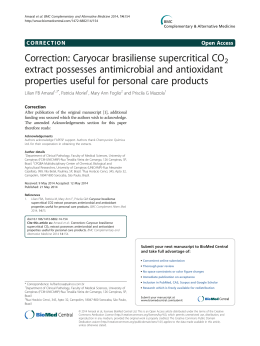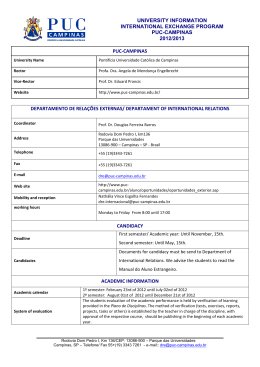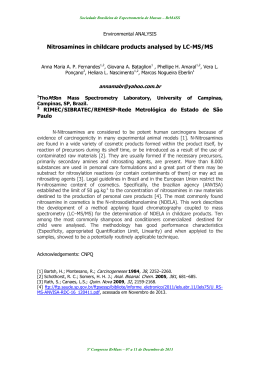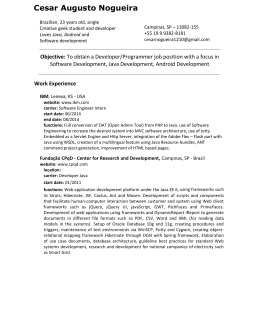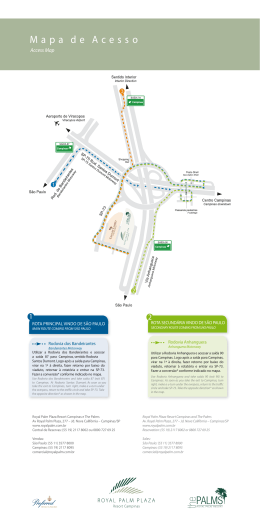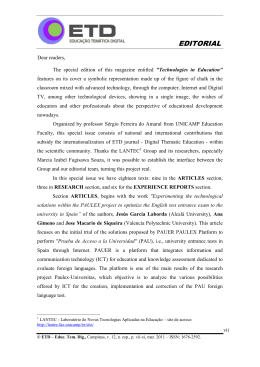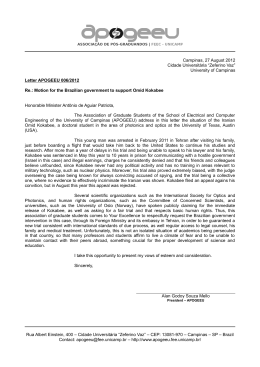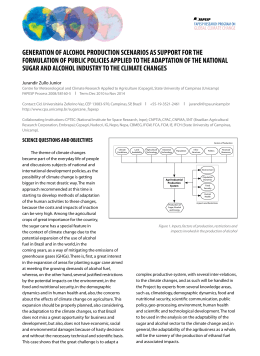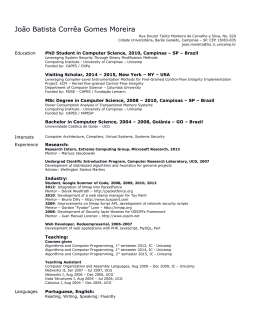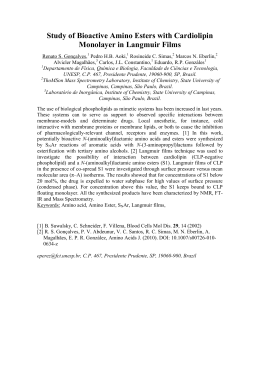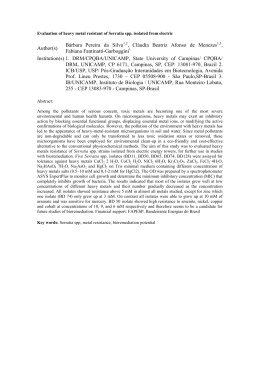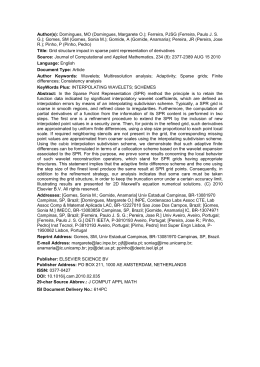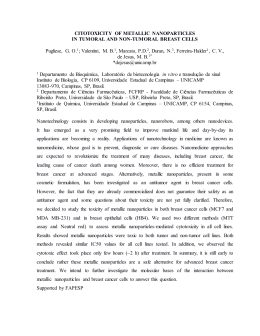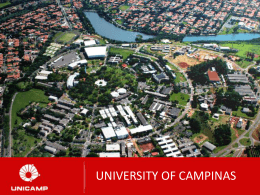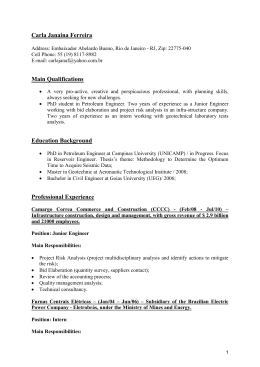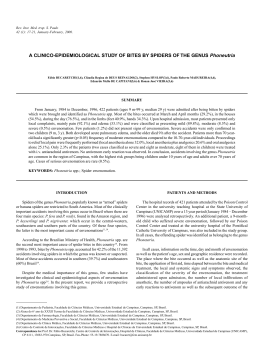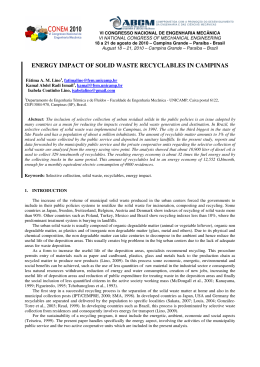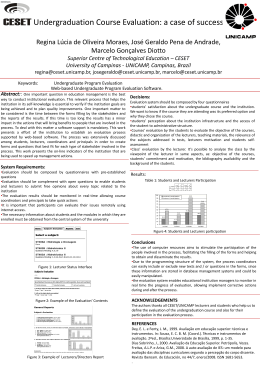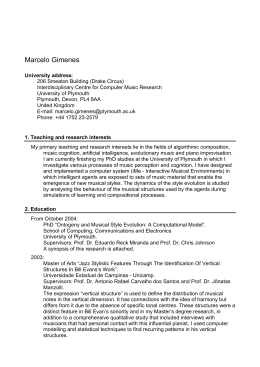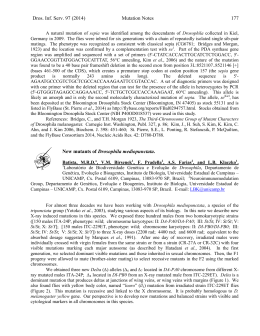Campinas, Brazil Basic Data Infrastructure Economy Science & Technology Universities http://www.campinet.sp.gov.br/~secoop Geographical Location 80 km north of São Paulo Campinas Founded 1790 Campinas Basic Data • • • • • Second largest city of the state of São Paulo 15th largest city of Brazil 1.050.000 inhabitants Population of largely of European origin (60% Italian) Regional metropolitan center comprising 22 cities with 2,5 million inhabitants • Industrial, agricultural, scientific, cultural, educational and commercial center, with levels comparable to developed countries (level of Spain) • 93,8 % literacy rate, 60 % with middle and higher level education • 99 % population health care coverage Cultural Heritage Agronomical Institute Old Railway Station Cathedral Education Institute Old Market Gazebo Campinas Infrastructure • 97 % houses served with water mains, 95,5 % with electricity • Largest per capita indices of vehicles, telephones and TV sets in the state • Sophisticated telecommunication system with 500 km of digital cabling, 400 km of fiber optical cabling, major academic and commercial backbone POP • 26 hospitals, 45 primary care centers • 10 museums, 90 libraries, 43 movie theaters, 9 theaters, 6 shopping centers, best symphonic orchestra of Brazil • Cable TV, etc. Campinas Infrastructure • Campinas International Airport: Second largest cargo airport of Latin America, specialized in import;export. • Ultramodern highway system (151 km inside the county) • Extensive cargo railway system • Access to the Tiete/Paraná river highway • Endpoint of Bolivia-Brasil gasoduct • Home to the largest oil refinery of Latin America (Paulinia) Campinas Infrastructure Dom Pedro Highway Viracopos Airport Paulinia Refinery Campinas Economy • 9 % of Internal Gross Product of Brazil (an economy with the size of Chile´s) • 17 % of Gross Industrial Product of the state of São Paulo • 12 % of the Gross Agricultural Product of the state of São Paulo • Second largest consumer market in the country • Fifth largest financial market in the country • US$ 3,7 billion exportations • US$ 1,57 billion importations • US$ 9.800 per capita income (second largest in the country. Brazilian average: US$ 4.200) Campinas Economy • • • • • • • • • 25 % chemical industry production 19 % heavy machinery production 21 % textile production Second largest petrochemical industry in Latin America 17 % of electrical energy comsumption in São Paulo 4.500 industrial establishments 50 among the largest 500 companies in the world have seat and plants in Campinas Highest concentration of high tech industries: IBM, Compaq, Motorola, Lucent, Nortel, etc. Major development in biotechnological industries Campinas Science &Technology • 3 universities with 41.000 students – State University of Campinas – Pontifícial Catholic University of Campinas – Paulista University • 13 R & D Centers – Informatics Technology Center (CTI) – Telecommunications Research Center (CPqD) – Brazilian Agricultural Research Company (EMBRAPA) – Agronomical Institute of Campinas (IAC) – Food Technology Institute of Campinas (ITAL) – National Synchrotron Research Laboratory (LNLS) Campinas Science & Technology • First fiber optics and laser R & D in Latin America, third in the world • First digital telephone switches R & D and production in Latin American, fourth in the world • Second all-Brazilian computer development team • First in Brazil in food engineering and agronomical research and engineering • Second in Brazil in oil/gas exploration technology and petrochemical engineering • UNICAMP is the second university in all-Brazilian rankings and first in many of its high tech schools • First in bioinformatics, second in biotechnology Science Research Synchrotron Lab CPqD IAC Campinas Industrial Incentives • Seven high tech incubators and technological parks: Centro Industrial de Alta Tecnología de Campinas (CIATEC) • 2 areas with a total of 4 million m2 • Strategically located (near UNICAMP, PUCCAMP and other scientific centers) • Favourable land prices, tax exemptions • Neighbouring counties with high level of incentives and industrialization policies: Indaiatuba, Sumaré, Jaguariúna, Paulínia State University of Campinas UNICAMP http://www.unicamp.br/ UNICAMP Basic Data • 4 campuses (Campinas, Paulinia, Limeira, Piracicaba) – 3 million square meters • 28.914 regular students • 12.784 graduate students (44 % of total) • 23.090 continuing education students • 1.815 faculty (90 % full-time, 80 % doctors) • 21 schools and institutes, 2 technical schools • 44 undergraduate courses • 120 graduate courses (10% of Brazil´s) • 1.000 dissertations and theses per year • 6.200 research projects (15% of national production) • US$ 210 million annual budget UNICAMP UNICAMP Technology Centers • School of Electrical and Computer Engineering • Computer Sciences Institute • Mathematics, Statistics and Computation Institute • Physics Institute • Interdisciplinary centers: Biomedical Engineering, Biomedical Informatics, Educational Informatics, Agricultural Informatics, Bioinformatics • UNICAMP Computing Center
Download
